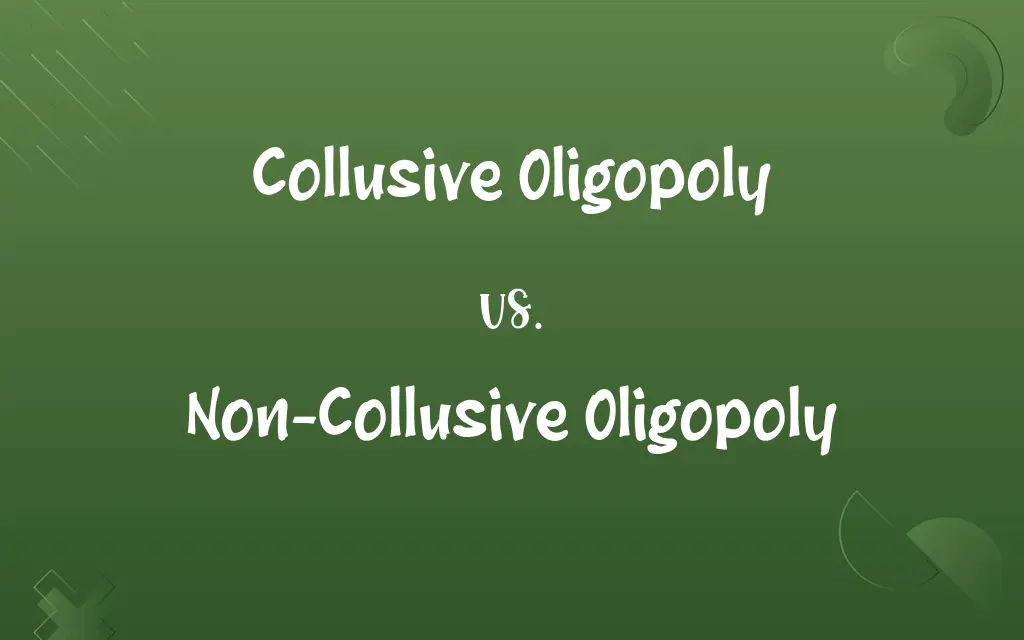Collusive Oligopoly vs. Non-Collusive Oligopoly: Know the Difference

By Shumaila Saeed || Published on January 18, 2024
Collusive Oligopoly is a market structure where a few firms secretly agree to set prices or limit production. Non-Collusive Oligopoly is an oligopoly where firms independently compete without agreements.

Key Differences
In a Collusive Oligopoly, firms engage in secret agreements, often to fix prices or output levels, coordinating their policies to maximize collective profits. Conversely, a Non-Collusive Oligopoly is characterized by firms acting independently, each making decisions about prices and output without any formal agreement or collaboration with rivals.
Shumaila Saeed
Jan 18, 2024
Collusive Oligopolies often lead to higher prices and reduced output, mirroring monopoly behavior, as firms work together to reduce competition. On the other hand, Non-Collusive Oligopolies feature firms that compete aggressively, leading to more competitive pricing and greater output, as they seek to outdo one another.
Shumaila Saeed
Jan 18, 2024
The stability of a Collusive Oligopoly depends on the ability of firms to maintain agreements, which can be threatened by internal cheating or external competition. In contrast, the dynamics of a Non-Collusive Oligopoly are shaped by strategic interactions among firms, with the potential for price wars and fluctuating market shares.
Shumaila Saeed
Jan 18, 2024
Detection and legal implications are a significant aspect of Collusive Oligopolies, as such collusion is often illegal and subject to antitrust laws. Non-Collusive Oligopolies, while competitive, must also navigate legal constraints, ensuring their competitive strategies don't veer into collusive or monopolistic practices.
Shumaila Saeed
Jan 18, 2024
Market outcomes in a Collusive Oligopoly can be predictable due to coordinated actions, but in a Non-Collusive Oligopoly, market outcomes are more uncertain, influenced by independent strategies and external market forces.
Shumaila Saeed
Jan 18, 2024
ADVERTISEMENT
Comparison Chart
ADVERTISEMENT
Collusive Oligopoly and Non-Collusive Oligopoly Definitions
Collusive Oligopoly
An oligopoly where firms unlawfully conspire for mutual benefit.
To avoid competition, the firms created a collusive oligopoly.
Shumaila Saeed
Jan 08, 2024
Non-Collusive Oligopoly
A competitive oligopoly without collusion.
In the non-collusive oligopoly, each energy company set its own renewable energy targets.
Shumaila Saeed
Jan 08, 2024
Collusive Oligopoly
A scenario where a few firms agree to control the market.
The oil companies in a collusive oligopoly agreed to fix the price per barrel.
Shumaila Saeed
Jan 08, 2024
Non-Collusive Oligopoly
Market condition with few firms competing on their own terms.
In the non-collusive oligopoly, car manufacturers introduced unique features to gain market share.
Shumaila Saeed
Jan 08, 2024
Collusive Oligopoly
A situation where oligopolistic firms engage in covert collaborations.
In the collusive oligopoly, manufacturers secretly agreed on production limits.
Shumaila Saeed
Jan 08, 2024
ADVERTISEMENT
Non-Collusive Oligopoly
A market structure where few firms compete independently.
In the non-collusive oligopoly, each smartphone maker set its own prices.
Shumaila Saeed
Jan 08, 2024
Collusive Oligopoly
An oligopoly characterized by secret cooperation to limit competition.
In the collusive oligopoly, tech firms set identical prices for their products.
Shumaila Saeed
Jan 08, 2024
Non-Collusive Oligopoly
An oligopoly without any formal agreements among firms.
The airlines operated in a non-collusive oligopoly, frequently adjusting fares independently.
Shumaila Saeed
Jan 08, 2024
Collusive Oligopoly
Market condition where few firms collude to manipulate market outcomes.
The airlines formed a collusive oligopoly to control ticket prices.
Shumaila Saeed
Jan 08, 2024
Non-Collusive Oligopoly
An oligopoly where firms make independent strategic decisions.
Retail giants in a non-collusive oligopoly waged price wars during the holiday season.
Shumaila Saeed
Jan 08, 2024
Repeatedly Asked Queries
What defines a collusive oligopoly?
A collusive oligopoly is where few firms agree, often secretly, to control prices or output.
Shumaila Saeed
Jan 18, 2024
Can a collusive oligopoly lead to higher prices?
Yes, as firms may set higher prices than in competitive markets.
Shumaila Saeed
Jan 18, 2024
How does a collusive oligopoly affect market output?
It often results in reduced output, similar to monopoly behavior.
Shumaila Saeed
Jan 18, 2024
What are the risks of collusion in an oligopoly?
Risks include legal repercussions and potential for internal cheating.
Shumaila Saeed
Jan 18, 2024
Are there any benefits to a non-collusive oligopoly?
It promotes innovation and efficiency due to competitive pressures.
Shumaila Saeed
Jan 18, 2024
Do non-collusive oligopolies lead to price wars?
Yes, as independent competition can lead to aggressive pricing strategies.
Shumaila Saeed
Jan 18, 2024
Can firms in a collusive oligopoly face antitrust action?
Yes, collusion can trigger antitrust investigations and penalties.
Shumaila Saeed
Jan 18, 2024
What's a key feature of non-collusive oligopolies?
Key feature is independent decision-making by firms regarding prices and production.
Shumaila Saeed
Jan 18, 2024
How do firms behave in a non-collusive oligopoly?
Firms in a non-collusive oligopoly compete independently without collusion.
Shumaila Saeed
Jan 18, 2024
Are collusive oligopolies legal?
Collusive oligopolies are typically illegal and can violate antitrust laws.
Shumaila Saeed
Jan 18, 2024
Is market predictability different in non-collusive oligopolies?
Yes, market outcomes are less predictable due to independent strategies.
Shumaila Saeed
Jan 18, 2024
How do firms communicate in a collusive oligopoly?
Communication is often secretive to avoid detection of illegal activities.
Shumaila Saeed
Jan 18, 2024
Can a non-collusive oligopoly turn into a collusive one?
Yes, if firms decide to form agreements, it can transition into collusion.
Shumaila Saeed
Jan 18, 2024
What impact does a collusive oligopoly have on new entrants?
It can create barriers to entry, protecting established firms' interests.
Shumaila Saeed
Jan 18, 2024
How does competition in non-collusive oligopolies benefit consumers?
It can lead to better prices and more product choices for consumers.
Shumaila Saeed
Jan 18, 2024
Are there examples of collusive oligopolies in history?
Yes, various industries have seen collusion, often resulting in legal action.
Shumaila Saeed
Jan 18, 2024
How do firms in a non-collusive oligopoly respond to market changes?
They independently adjust strategies to market conditions and competitors' actions.
Shumaila Saeed
Jan 18, 2024
Share this page
Link for your blog / website
HTML
Link to share via messenger
About Author
Written by
Shumaila SaeedShumaila Saeed, an expert content creator with 6 years of experience, specializes in distilling complex topics into easily digestible comparisons, shining a light on the nuances that both inform and educate readers with clarity and accuracy.








































































